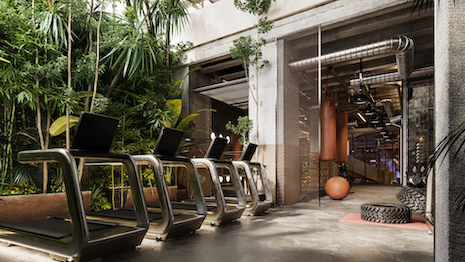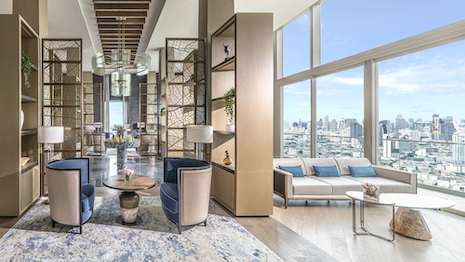The global health crisis has significantly altered global real estate markets, but branded residences have shown resilience over other sectors.
Within the last ten years, the number of global branded residences has increased by 170 percent, with an addition of more than 52,000 units. While hospitality brands dominate the sector, participation from art, fashion and design brands is expected to increase and diversify the future of branded residences.
“Our homes have become our offices, gyms, schools, etc., and developers and brands alike are pausing to reimagine their programming to meet the changing demands,” said Adelina Wong Ettelson, global head of residences marketing for Mandarin Oriental Hotel Group. “Now more than ever, buyers are looking to upgrade their home and lifestyle with one key word in mind: flexibility.”
In this Q&A, Ms. Ettelson discusses the value of branded residences, how this sector is shifting the global real estate market and how new values and lifestyles have changed expectations for home amenities. Here is the dialogue:
 Adelina Wong Ettelson, global head of residences marketing for Mandarin Oriental Hotel Group. Image courtesy of Mandarin Oriental Hotel Group
Adelina Wong Ettelson, global head of residences marketing for Mandarin Oriental Hotel Group. Image courtesy of Mandarin Oriental Hotel Group
What is the value of branded residences for a buyer?
Over the last decade, the branded residences sector has evolved tremendously and seen growth of 170 percent, with further expansion and diversification forecasted in the coming years. The rise in popularity in this sector directly correlates to the array of benefits provided to both developers and buyers.
For developers, having an international luxury hotel as a branding partner provides instant global credibility. For buyers, purchasing at a Residence at Mandarin Oriental provides significant advantages such as the assurance and management of a five-star hotel group, dedicated 24/7 service, luxury amenities at your fingertips and hassle free living with lock up and leave capabilities that complements the lifestyle of a ultra-high-net-worth individual.
Since COVID-19 has had a significant impact on lifestyle and behavior, how might the expectations for amenities shift?
COVID-19 has transformed the meaning of home.
The growing demand for multi-functional space, outdoor space, privacy and tech enabled homes are a fantastic opportunity for branded residences. At The Residences at Mandarin Oriental, we work closely with our developers to curate spaces that compliment the ever changing needs of our guests and residents.
For example, The Residences at Mandarin Oriental Tel Aviv, which will be delivered in a few years, boasts a wide range of unique amenities that cater to this new normal, including an oxygen Zen garden within the expansive fitness center.
 Fitness center at The Residences at Mandarin Oriental, Tel Aviv. Image courtesy of The Residences at Mandarin Oriental, Tel Aviv
Fitness center at The Residences at Mandarin Oriental, Tel Aviv. Image courtesy of The Residences at Mandarin Oriental, Tel Aviv
How might a rise in branded residences affect the real estate market as a whole?
Branded residences achieve a premium on average, of 31 percent over equivalent, non-branded properties, though this figure significantly varies by market. As we continue to see a rise in the branded sector with many players entering the market stemming from the demand from developers, competition for the luxury home buyers will increase.
Developers and brands will need to differentiate their product offering and provide buyers with a strong reason to purchase. After all, a residential product like those we offer at Mandarin Oriental is not a purchase for shelter, it is a purchase of a luxury lifestyle choice.
We also expect a shift in how residents use their homes. Individuals may now look to stay longer at their off-season homes and our offerings can easily allow this without comprising any levels of the services, security or amenities offered.
Do specific regions stand out as opportunities for branded residences? If so, which regions and why?
Miami, Dubai and New York remain the top three cities for branded residences in the world.
The Residences at Mandarin Oriental currently have one location in New York City, with a second and our first standalone property for the Americas in the works, and many more in other parts of the world including future residences in Dubai and Boca Raton.
Asia Pacific and regions in Africa, as well as the Middle East are expected to see the largest growth in the coming years. Our most recent opening in 2019 was in Bangkok with our residential debut in the Middle East, and The Residences at Mandarin Oriental Muscat are slated to open in 2023.
While the majority of branded residences are hotel branded, do you suspect a growth in alignment with luxury goods brands?
Luxury hoteliers continue to dominate the sector; however, lifestyle and non-hotel industries from fashion to automotive brands are growing sub-segments. It is a natural evolution and a way for brands to tap into their loyal customer base and expand their portfolio.
As long as the brand extension is relevant and offers something unique, it is a chance for customers to associate themselves with the brand prestige that comes with ownership.
{"ct":"D7VZrUVGzyB3DdTh7Ir0hjtONivmCXHTQ6UeuMW3l+ns0QlYK4ywGLYj2cOaJCilnA5Nr\/ehwAMG6f7bADgqJ3n71FlWy17O9\/YGZA3Mw94F\/QMNAH2D7HMhRveNp3Ctdw1bphE4PGB6+T2zUKL34A7VXm0oj21r5+7aliz4fQbxUVT2R+qbuAOaO1CUHrByd+GfPXFeCHq4uRwnFzcQllnc\/Ufl8U1CRUe0CtKKsxrGeu1o7mA0\/X9t+x05OEIB8\/kEjmDWSAW1gMiDCxgZ7p4RkZoNwrTNZEYRXDZt+takX+bJiC36e4dq6D0n+V3\/0Kghsu1hY2HQk0k5M1R+fAmX8gfhBvEi2hABxEpljGXyK2wL8qPwdqsIhNWBDmxkDbt+qpo51lAVG35ziU6xD+N8zBb9mDDs1zU3Y8SCXUut2lk3BzLAiNQOA751FP\/G0Tn1JUS3o8ijaMlKNPcVfwJN2IgO02S0MRwiclo7uBffftSepzqOSSF87wnFCrv5C3Xmv1PVp2v+jR2FCcM5Fz7Mp7LDqVOucmZ0igmaU0iHhT1iuqRAw0IcUOA3m8SdomHNTBJguEFO1YxVC0\/d34fEI1TvckEpn1SqSNKxf6\/NBWR1cX+2RFI20Ajg8fFjLxd11N\/i1+pd2II7amR90nXQqLf6pZrIVn0EoxQ8dqoeymrfHBNxBOg5Mrm1fMEr8h+cawoTw3XyZe4yP9WDZsxCch5B\/APF4JqzEyf0YoDfQtTbwl+dIJcVUHiIXt8FYIcQ8ogvapaCg4gYKhfHrMI3MhSRsVf1wGhtq8mk5\/TqdjXtM444Isfvd22M55qf8avoq2fgrin+PsQaV8rYyynupG\/mjQmpeJa733OyHz+92HNOE+yvFfihKNSdGD138KmL1dW\/lxFPfU\/5TOLSI1rhm3biIrzpxdCI6IHFyPsbWj94rrpZyLMxCOTfHa8y\/MI2lWBfxuWI0c\/UAxbJ0zzpHlqoL6v\/A7EKyN\/uhKTV1xkhIsMpXugpXr1R+qZTp+vdQwyb2FynLzrOOn8BmDzlZd2odW0M4JYt2wchgD+FpAuKLzMaF3imX7gdFaiqgs8AWL3xq2orA3qkyxeaPc\/UOXpTL+1fSpRJZRJdtrx\/ge5KUyiScqZiRyy29otvPULsR+Ixd7KOtsojJ9aC6R5jT6TuVYdPAxXG53m0E5k7U9WokSW+nZTohOLMJnX\/Kf4aJYpBw+PpxDCWooBgNBsgo7TAZ+h1obMQiKZmBQk4vizJsDI8e4xuTLfZSawoftZnaw6is5Lqhl03aKVCecMErfZ8OhElhvxwyjZSCvqCl\/\/W4TgJyOLEoq7duKptQLb4sF8OsjOIIEmQog9zygub3K\/ZDEt1jaGNbDL6rK59K087OWKha2j5\/6Bzir+qSi03JHVeDfezaR2IzWBoYsr\/suLiKa2KmaRKex\/S0emaQlkW9DhnXSNYmawkTVeH5oCJSntbAAWcHxOBi56BN5FHKzqRGxwIUWM5i3qryDYwZ8FhLVuKq+Jw0vvaztYF+09KiM87NmIRHn7OdeT40DaQS5ls9niwC1JMEvUrrBURugHyrGvyTeWlTymwa2Kpk1YStUY3QihCFihuilhRRV+em9roze5B4xDChzpHf1UCaPnlZjrUxu2M8+RI\/ynRKgQIcVsvkxoxWP8DgRH8Uvo70+0kN7+VuIanR1KVPreq78sh8Pq\/dSX6uLOpYWuPeRX8dkkKbWw58kQN5ws6nXDR1BweAEsbp0shnNKGHurm\/o96OD1CS7jk9Y9M67DUKiWNJwNx94Xl85S6PIsIfQfvKnDmJtB6YNidxpW\/OIjI3Ry9fZsoDvai\/Et77WQZMbp7naksx77A7zYlh0W7QIw7ubmqdjq8E2q7LFHlk9Dyl6VOjNiJlWum4IxrIxpWhR1eealdNboVKUdU8Xgh25ZMx4+Y\/CKWdqZJTokJU4sPBX1B\/6LD38Xsz0nigMEZN956aL1x9aT0CMfBfcCGrHjcQfhk4zVIaF+HwDjsqvqNo5BAcNj5+f1+\/KFtoUWExkZ3lfbUnoJcDuLrShtaukITecFPMJEfZk7wOsoPBVN6A9Y03p\/6OaGWq9DfAu++GapvK+Hlg5nkwNMfPn5JjLdAmvL+sHdBdM5jSmC4QOfyouUPU4Xf2cCkLSOOmu1dfE1xP0JpYaKJu0\/2\/S6AUlsuhx1JiC6JVFM8tkhrvRRq5\/LTJSDFygqiBrs\/w39A07nyVuRlpKMtYakqIt7uOKIHWp2jGE3iWOD6jVyiXImuCUs+g7DG0Q7VPpfHsJEVStxi6gYdjCDVV0ZM1DP213KRbnecJvpOpEMWXy4VD+gvT496brgdPV9M1HWyvMSEgAxJWlPx4lNmiu4hLTQqq\/9WDaRoJXEHBuHBn\/dbrD2Johz\/anq5xC1hBDO278nMnMLnysQB7amiKwsc5Astul8\/FnOktV+4lK595VYMsb\/CGSEp9THby2PdJvMjAcSqoWovFVB1RGIMSXRRGyysQ3ekUxTXoiBnSAWymNPChRjab0WMpua3bZC8fr12lXQiPG+rExBAUbZOHyoQgZd6jWIWQp7YdIgzT3xE9AX7O9L2ZQ9JFKolVl5yl+TL2Nygvlr5TaNfwEbbM+PAejWwfG3SZkgoAJRgOTZXhHJkeeEYdUKlZwTFeCp1wGSnZOLO8rX6Czj+1rwg4PBPucZSztcWqlRnjlz3K3\/QAvajdaaI6xhDfnVVgE46galK98wgjS50yn+Iynq8xHBhUXMhch00m1R\/lVu3YBWoRxEgBro8Ixxd\/1QEb\/TeatMbQjuTNRo5QMTIbZAGcTxfp2uDTc6w3xy84xTZdah9B9PLuJIq10ore4NISV\/+dBpXNW7prw34J2CIPMevpjnYY6W0OU3AWsHIGIj7ibyOzZff0URnNU4rH7DkkpFA7icGxJQmNusWbeD0kKmI1sJoFZm2ECWe5zGEpesrVIVQjWpCKQEqbXD\/bnuw+X\/kYvhFLC6o60AM\/JpEVFJ7cME+o2m5W\/+1LGVrf3eCqfmfPUtQRJGYAZi569lolAQgFDbJwWUu9mxXGJofDb+H9IfFTOeGPyrp0xQQgy9wZVDbsAUX3eXbjoLaRDr4lAWu2BsRxqVhn4JQ01S0Zod\/Qwxws0AnwjAmrdF835TT\/Zr4Y6+6ZCBjDppS\/oxPzRf8+92fHttcwBg6ldX1yHWp0yseDTQ9qIFocpm9DcgR3Kbg9VNJnz3Y1u6ZJFNHO\/\/lnsXaW3VpazPopvdJobi64Q\/MYxpTZWWJyijmFz5Fwpq9R9GUEvdCeCF08Xe96JSgWbGsf+QPmh\/1Qle+BUGkRBgl\/RBeiR11jPwiGnb6x8DcgSEvWx5khmQ7Z+1zoWEpszXJJolJBMZe+GA2d1zUg03NQqL9D9ehQHUwHp1ciWFQVe5NR8JBZv2dO7tUcuD71voFrPZx3TrkCPzbmpDz2z2uAcmtOhDovcr8NP+ilAI4ISVCP7+k0vC8YUPjo+w4wELX+MHD\/x5PkeyIBbPKntwC8CVKPUlnGbhrJs8T6+nCxO4Z\/ZVSnCTuDR1P+77Dgc5OM4ybF+2gwmURZpJDI0IOgRoF7DNZCBb8qYC5LdR\/43hLJB\/ZmWaLd3bDPlGzqKsOS9iGiM92ZxytN1Rf4m4z\/5KwpfoIqmRg1c2G0VctjRxm9q7Zf9YNuMn3n8AbCXzGpORqKyrzclLgCZ17RYE5CaNmzGPD8+jnzOQff0R3PTMy1mIuUtRX8xGXhhaPfCepVup1jZgAvJjsCOggmL6BgWGdsn5MBM8Yn3nvBca4s7VmD2WwZ6ZzbiH7XM6JxRcUmQMPxW8mHSMQFjEdwrQ2708H6Xc7J5MowyuYmVfIT0V7ywyDrnOjAm1yCCerC\/i57X0SIHEXdy\/oUfLmEYdQEUp9ON6OUPsZPLuiFlUEyjiRouMU3k2twlcSkXIhnoYz477W3Iz82TYwt3E2Dt4h\/14mHyrD0rYVwY2ON8FDstWlw3MyfYfrD4n0PHx6iN5kVuozFBSVz+YN2foZUagEIoMrFXrI4qxej1WIvaAEe+hfhPraxbKtuIbz2ayi+wsQprl2CNHq6jWhksQJQFTwlojiCXPwErzi\/lmLnLHjsHzol\/YG\/OgU855nGVQKI+n1LtRfvynyWcmqOSoyk2Ry92K23SOJPmf3HZQF0FmXF1dvDBYZO7ggi4mtGie5uH2Eh39twwaWzlqQJSGmAfoQ+Ek3sEROnqvhYn+uISNPOu9C\/4PeHUaKH0u9o6MSvBja2eO+5r\/DYa2SrqpOq1pHvK2aOeGFLWolMSK5ABUGWK7bi\/ZiB6aq2Em2wjV\/MWZI79zR7xn0ZybC7zThWfMmhpORaIUTwcwLKhUsnGIVMflYjGvkiicYn5VrX9H8EKW6yLC+NLUVG5z0\/MjzSb72BsFd7BrqXHfJL73C1XfPo+FEMYKP3kP42Wdse\/L+Y7xZigt8qiB+MDmLjnAIvEUws+DkywYdkxISSinjWX0loyWn6AQv8JECWMHir3PzV9l0SVTdqaljbT6D5jSlEIQSZpM4Xy3\/+Qda1DdZLW2nrefKWzkfUBI3TWo7i8P5sicEK0\/VK27orpzePuePjuH4Hc\/EtHlsSrkBNaGmnHC\/hjj3W+MqZKcfPoA1yZtRNDZzu8h5uMcr5CrXoEWd3MnZ1+RL+M21UquDNMhhMfK\/Woo4UAfFQNXYvBSTr4dyCINxik\/ohDgnvMDc7PJnA9Qyjy4EeHowcWbMtr+1broUYHwu\/cOHMvdwphaxnO\/RU+uDrQ4iXC\/5Ek1x9\/0gmHDP1DknUrLYtu4Gb8cFr9DFPatRxMbijelLzvZVYUAjYteCN7YtedM11MhaadqCN9JvEaej0m9P136uGJLU7yzBDKMw6GPwTOgNW4MY4ceh81T+JEg1+utxduH\/+YacsgZqjJBg1hZ6n\/6ZFWt8P3Ofqt9X91cD0bjSwIGf1gyeOKAg4BszH1DV8OSBIdIIwWV7h5Xla8xLB5qogwSxgD13QGqLuZ\/v5Fw+JPWQwCyH9guh+LPuX7ojMNuSvcR+CIgWGtc13fSVwxfw+OwGZL7Y5hV6vajM7HBr7E9VngdGki74fMmbnqkcXmC5yiUnYiTE++sjXh2aO6K\/bKBDu8nIL1lfQT3FYxYCK4Y+7yz00Vdw+QxmZjvEXds33C2ojIAwwnBbJ5DNsZs6Ulr1I66Fj1N3Ri5u9Q8AyFqs4JO669nxknBQojf56AF2qvD3GLfE5bTFoYa60nvGpHs3juWb4PX5QAn9be0H8x7R\/Z+iNdWWYaAhlsFxjNlkhjwHxUKyyawGEguU3fyqOXY\/h1nOMQAtDs1Y5HQGogXO8XaRqTkHNGdxHqA3URkfUThhDz1m2zKCmoAjmgTKE9e6Hr2FKtgR\/LC5Xs8jpcXwfQwYJzlESlIZoB\/9tY+845ljJlpTdbkH+B5Y8+3esQdi4X9YtosE0qiWk8T0H\/PfiKBWH1P3WDAjqIgPvrc7UqO20EGqBrwp9z0fN0FL63ia8FTMxtqt+Bd2Z9fvCIzawfWapPy5J3nktT7RCNoJzEPd1KuTbkl4PaMYsjhEd9e6I9YSnOVpiB5BuiB+gJ0dxGwc0sXRk+gHMef9DR7xDjQVu4gnzAdDGqDHY7IfT5iQJN0Oa3Ao2txa34YXvzXZCNQHbVYc0QS0Ym5nr9Wwcbsx5BeCpARCp5cp0w2LlR0o8KgTDUMFq9xCBTuEYxR5fOERhmiaz75VykGmq2jteuWrSrHqh3fURL7YK\/dlKc381O983ni\/Lzzq\/0frpcW7N\/4AQcKXpLuTkF9J0QU8fKu+7jK3jwmAeL0Bq1L8AUwPCIaJCFgGd\/Q7iyu77gV2XYL43bcrr6fDTYilGcK6NDnO\/xly0fgJoCmc\/ihQ50ePlj+T1Cr\/qIPQKNYdGMv534++n6gi8qUYivq\/CaAA7FF0AD\/SRcqS03vID04uhMheAfsjD72VByOvAZLRsCFgLcjQKWsQfRqwxzLSvtNZ6FO\/yBkjSQ5g15SOc7f63MvaAC35aZjTjlPIRcOGbcFHlTonBcU3fX2CHY+SUY3mwk9ZPOVjMd5xzR3dKaa4H8kASg73rrqFHHxWHQjwv3cx3zv1s1tJg4ub1uLnprgZ3b1PTZdv7qQW+S\/vlNpPt8TRyZhAWSqnhzDOskmQTZMCH0z1TutN8hEMOpXwyDXxvGt2nOIUUgjv0vLWxLMUaKLlh4pFG9QNEM4Q96\/PfhWWAI6VpiCF5MncanuKWBcJpcyqH7aerLokTDIXHqdNV1LN0LuJqlNdAsk9x1qr8775LBdMT10Un79rBzs5u6NkX7PXdTpAxrXPfIkg3FNK06SU5UqlZkMJ+Wh2kp8BXl++h1IW+vMW+LlY7a00Ugq\/P0VP7chRjTwTgQvM+eR+G\/bFzJ0T0CJsIgMfrP52yDIGF8QB4yw5QSfGx8xqGAPh9MAJNlJurAL7eGFNTgcm5qAkcjHsLmjeihxtIp55So+Z01CN90rkHJvmG0wkRHAhjZwtrGy9+Wn\/tmLf5bOBeBg51BQgOADoawqlydzcl\/dhgNi9hH+uuBDcDbuKJcYw6vwBg\/3iOXkgZAjxIbCRdXffuUQfAFskIPy+gm5GU5c6Fqrf2q3hX9g1oGLoZnM2Ct9lXzmtn6WdrwexK1wSLZ1Zho84T7utduGsY+E0uK2\/xqBqZciH3Ef\/Kls7R61EEvbmc7+icpEkXu4DD8Pfkwv6xlbTaWykEbmI\/J5St4U6qr4A+zXE0CTlsRDjwo8uREjUueHWeZkvBESvzC1+sbtWkowd+nzrrqPvhoyC6l+XR3zD4KrEoYSSgxjuE0k4HcZWHddFckxalCG49xWeKRYbmp\/GncaewDpOwUtS9PGwGdvNW2QHzP\/jZNQ9MAj5QJqAt7kcMTnPRAJQbpnPa2yxkKz4FMQtbiJA5m+Z0GRuCdkx6\/6bRHYuvajlcU2CPb0OvR2ItFLFWr4RaEmwer7ajMwW3+XPN6v+kCP44sC8JqyR+3mUohZM7U8vpwzqCsLKjkvz4HjhmUJmkBT0W+IMGal4iDwGU4fuI8QGs227bkUsDhdSTx7OEBmpYUq394Ukj\/p0xaL+fyzzeqAxQWJlAuDcPPUG6I\/5bwiGK3khbfwH\/VbNlCwBLVoQICtUpQ1ROMDH3XF5iC1wsjD\/gA1PFKL5eqzVSezS46qmScPThdBou7ikh9l2BFEegYtTh+nUMubY2Sdq8Z9LEBbFFdzeroE9p4VGNj4Bz+KwQqXQVcE5hXO6qxu\/q89wYEtU6lLYXH5HAXPhuYfIl\/gw2mhoFlAFMeQgP9o0k4zTifYEjpX3ZsiEdNx\/690UoddwnARv5h1iF3JVgMhJAOXR3ZIrabRvbA+LxDwwVuG2oyTKxzA\/A+HrkkpKJHyfxDrfu4EU\/d6t\/a3Mj1e25oX8Y5TS9EIVWCGlZngKnn\/rPowuyGvSbk8Jz8ltoFACXx\/MfZl3EVCdgWPMGtdMApaFhPl0bcZ5m2ULzBzy9ZEtRRhYEb51fuF2jzlbsFF4pqcGK0xcIJapuEqNxqj\/84WSReKGcI6guIyuBo1zLQjf\/NrDD07VDdRaSJcVjU\/X8V1VWTuPRYt4m31gk0kbYqHVAPfDLQ70zR6gVZ82c4Oq3oLmkADmFBJeYCSI2eP58AtQuybs1MJRBpSuIc6J+cTpdPyXewXR7M9HZMTPe0b4Fv0Zkfs9tXp35mZsXj8ow9fIwlWLTMcrmFwDyKU\/spekAFgCvYNue1auv6ZkTJKS2OZVdXDB+YjhVgTB3A4GpmuRghp8gAZeuGcbpkqDBwRWQBMW2tVpnCZKTTVe1xKfZ08ywLx\/wznfNBmYbnM6jkYR5nwSJJ8WsiokOOBjwevcjIO7BGzejWlkJr8IJKKpUWabAK8+umjAA9RsYzhCSBQeQmD+tEfx\/dcnY3iR\/Q4D7jfPx04nqTEmffuqAeR95irKthh\/mF0aeXgzyjEwUoiB6FtUkgxS9prVYDQyFBfVpBFcbwKBGKY06QPLtrRvDAxb\/CwTTEO6TBJEO9MfrMVJDMS05BPpfqbH2tJc44JhL99IsqsClAizI9bvIsX41E5oCFmqj6q4\/BSt5gv1HE0rVpX3ZxKE7Wxkq+o86cMm8LUvBAdpgol4HJKxJQqis25PbrfB4LP1\/YK9KaSkWS1QCFcGzPCRbB\/oNjDqyb3RaoUyNhg30k3JEkf8P7+pTvSAC5F3tlAAOnhqbwXl4+35bk0gZ3p\/nVNtVbzENdcy0X7L18jpSIiyooOneaT2vavC2A2uS26kOUR8ZGSrf0i1oXMeXhStWeiovVqbXMYIUb2JoKFyrC7LtfW7g8uub7ULf5TmYpSMAjxgnNRojzjv\/xRiZlpQ1mLnmg==","iv":"bf7372917f5e90f5282e06fb8d199e3d","s":"f8f188d1ce6b892c"}

 Residential living area at The Residences at Mandarin Oriental, Bangkok. Image courtesy of The Residences at Mandarin Oriental, Bangkok
Residential living area at The Residences at Mandarin Oriental, Bangkok. Image courtesy of The Residences at Mandarin Oriental, Bangkok  Adelina Wong Ettelson, global head of residences marketing for Mandarin Oriental Hotel Group. Image courtesy of Mandarin Oriental Hotel Group
Adelina Wong Ettelson, global head of residences marketing for Mandarin Oriental Hotel Group. Image courtesy of Mandarin Oriental Hotel Group Fitness center at The Residences at Mandarin Oriental, Tel Aviv. Image courtesy of The Residences at Mandarin Oriental, Tel Aviv
Fitness center at The Residences at Mandarin Oriental, Tel Aviv. Image courtesy of The Residences at Mandarin Oriental, Tel Aviv